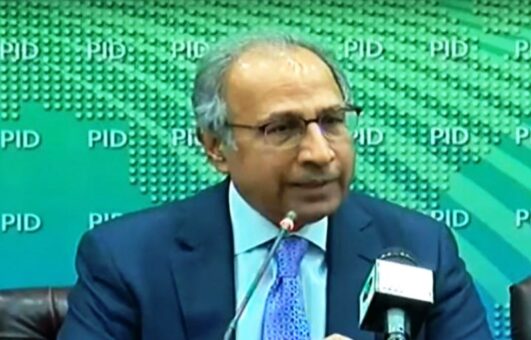ISLAMABAD: The headline inflation based on Consumer Price Index (CPI) increased by 8.6 percent on Year on Year (YoY) basis in June 2020 as compared to an increase of 8.2 percent in the previous month and 8.0 percent in June 2019.
Pakistan Bureau of Statistics (PBS) on Wednesday said that on month-on-month basis, it increased by 0.8 percent in June 2020 as compared to an increase of 0.3 percent in the previous month and an increase of 0.5 percent in June 2019.
CPI inflation Urban, increased by 7.6 percent on year-on-year basis in June 2020 as compared to an increase of 7.3 percent in the previous month and 8.1 percent in June 2019.
On month-on-month basis, it increased by 0.7 percent in June 2020 as compared to an increase of 0.3 percent in the previous month and an increase of 0.3 percent in June 2019.
CPI inflation Rural, increased by 10.0 percent on year-on-year basis in June 2020 as compared to an increase of 9.7 percent in the previous month and 7.9 percent in June 2019.
On month-on-month basis, it increased by 1.0 percent in June 2020 as compared to an increase of 0.3 percent in the previous month and an increase of 0.7 percent in June 2019.
SPI inflation on YoY increased by 11.5 percent in June 2020 as compared to an increase of 11.0 percent a month earlier and an increase of 9.3 percent in June 2019.
On MoM basis, it increased by 1.4 percent in June 2020 as compared to an increase of 2.2 percent a month earlier and an increase of 0.9 percent in June 2019.
WPI inflation on YoY basis increased by 0.9 percent in June 2020 as compared to an increase of 1.5 percent a month earlier and an increase of 14.0 percent in June 2019.
WPI inflation on MoM basis decreased by 0.3 percent in June 2020 as compared to a decrease of 2.1 percent a month earlier and an increase of 0.2 percent in corresponding month of last year i.e. June 2019.
Core inflation (NFNE)
Measured by non-food non-energy Urban CPI increased by 6.5 percent on (YoY) basis in June 2020 as compared to an increase of 6.3 percent in the previous month and 7.3 percent in June 2019. On (MoM) basis, it increased by 0.4 percent in June 2020 as compared to increase of 0.4 percent in previous month, and an increase of 0.2 percent in corresponding month of last year i.e. June 2019.
Measured by non-food non-energy Rural CPI increased by 8.8 percent on (YoY) basis in June 2020 as compared to an increase of 8.4 percent in the previous month and 6.7 percent in June 2019. On (MoM) basis, it increased by 0.7 percent in June 2020 as compared to an increase of 0.4 percent in previous month, and an increase of 0.3 percent in corresponding month of last year i.e. June 2019.
Core inflation (Trimmed)
Measured by 20 percent weighted trimmed mean Urban CPI increased by 7.4 percent on (YoY) basis in June 2020 as compared to 6.7 percent in the previous month and by 7.3 percent in June 2019. On (MoM) basis, it increased by 0.4 percent in June 2020 as compared to an increase of 0.4 percent in the previous month and an increase of 0.4 percent in corresponding month of last year i.e. June 2019.
Measured by 20 percent weighted trimmed mean Rural CPI increased by 9.9 percent on (YoY) basis in June 2020 as compared to 8.9 percent in the previous month and by 7.2 percent in June 2019.
On (MoM) basis, it increased by 0.9 percent in June 2020 as compared to an increase of 0.5 percent in the previous month and an increase of 0.7 percent in corresponding month of last year i.e. June 2019.








